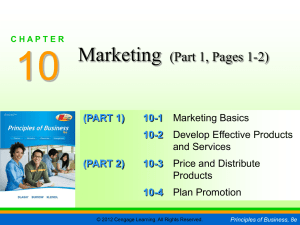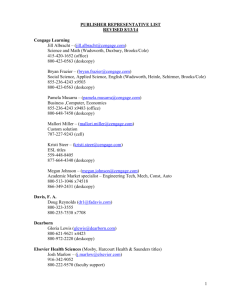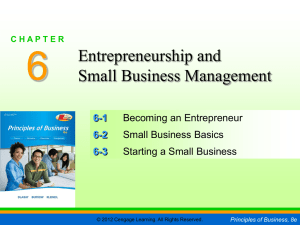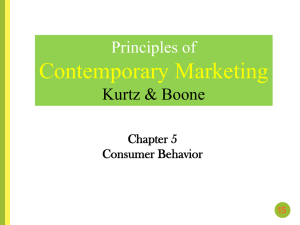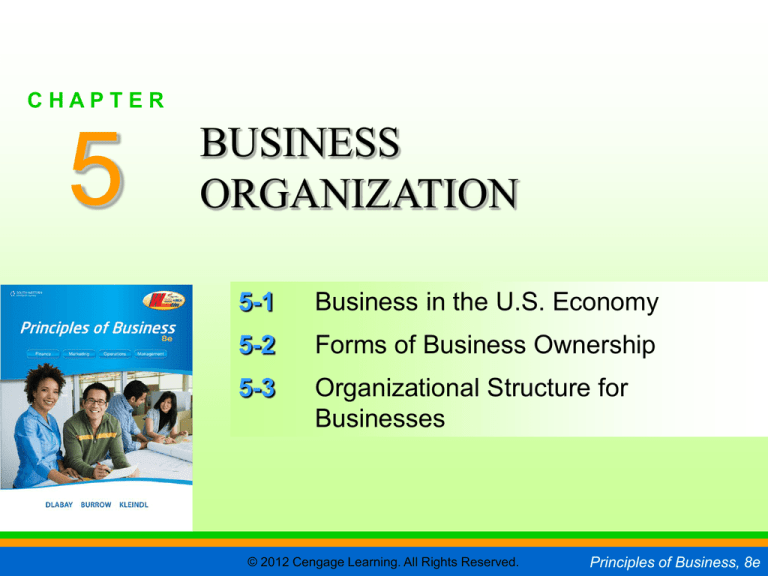
CHAPTER
5
SLIDE 1
CHAPTER
5
BUSINESS
ORGANIZATION
5-1
Business in the U.S. Economy
5-2
Forms of Business Ownership
5-3
Organizational Structure for
Businesses
© 2012 Cengage Learning. All Rights Reserved.
Principles of Business, 8e
CHAPTER
5
Contingent worker- employee with no
long term obligation (short term or
temporary worker)
PERCENT OF BUSINESSES BY EMPLOYEE SIZE
© 2012 Cengage Learning. All Rights Reserved.
Principles of Business, 8e
CHAPTER
5
BUSINESS ACTIVITIES
● Generating ideas
● Raising capital
● Employing and training personnel
● Buying goods and services
● Marketing goods and services
● Maintaining business records
© 2012 Cengage Learning. All Rights Reserved.
Principles of Business, 8e
CHAPTER
5
TYPES OF BUSINESSES
● Producer- Create products and services
Example: Extractor, Farmer, manufacturers
● Intermediaries- Selling goods & services
Example: Retail clothing store, COSTCO
● Service business- Offer something intangible
Example: Dentist, Teacher
© 2012 Cengage Learning. All Rights Reserved.
Principles of Business, 8e
CHAPTER
3 TYPES OF
BUSINESS OWNERSHIP
5
● Sole Proprietorship- 1 owner
Example: Duncan’s Landscape (small business)
● Partnership- 2 or more owners
Example: Law office of Smith & Williams
● Corporation- A legal entity where the
owners are shareholders (stock ownership)
Example: Apple, Wal-Mart
© 2012 Cengage Learning. All Rights Reserved.
Principles of Business, 8e
CHAPTER
5
3 TYPES OF BUSINESS OWNERSHIP
Sole ProprietorshipUnlimited Liability- Owner is 100% responsible for the
business
PartnershipPartnership Agreement- Legal Document that defines
the details of each partner
CorporationArticles of Incorporation- Legal documents that
defines the details of the corporation.
Stock- shares of ownership in a corporation
Limited Liability- The risk is limited to your investment.
© 2012 Cengage Learning. All Rights Reserved.
Principles of Business, 8e
CHAPTER
5
Forms of Ownership
U.S. Business Comparison by Form of Ownership
Form of
Ownership
Proprietorship
Number of
Businesses
(2006)
Total Revenue
(Thousands)
Percent of All
Businesses
Percent of
Total Revenue
22,075,000
1,278,000,000
71.53%
4.06%
Corporation
5,841,000
26,070,000,000
18.93%
82.82%
Partnership
2,947,000
4,131,000,000
9.55%
13.12%
30,863,000
31,479,000,000
100.00%
100.00%
Total
© 2012 Cengage Learning. All Rights Reserved.
Principles of Business, 8e
CHAPTER
5
Checkpoint
● Which form of business ownership is the
most complex and difficult to form?
● The corporation is more complex to begin
than other business forms.
● Forming a corporation requires much more
bureaucracy, is more subject to
government regulations, requires the
organization of a board, and must have
clearly defined bylaws.
© 2012 Cengage Learning. All Rights Reserved.
Principles of Business, 8e
CHAPTER
OTHER FORMS
OF OWNERSHIP
5
● Franchise- a chain business that you can
purchase for a fee. Any 3 of the
ownerships can invest in a franchise
EXAMPLE: McDonalds, Sport Clips,
© 2012 Cengage Learning. All Rights Reserved.
Principles of Business, 8e
CHAPTER
5
Checkpoint
● What are the other specialized forms of
business ownership?
● Limited liability partnership
● Joint venture
● S corporation
● Limited liability company (LLC)
● Nonprofit corporation
© 2012 Cengage Learning. All Rights Reserved.
Principles of Business, 8e
CHAPTER
5
KEY TERMS
● Mission Statement- a written objective of
the company’s goals and vision
● Goal- the objective, what are you wanting
to accomplish
● Policies- rules of the business
● Procedures- methods of activities that
support the mission statement and goals.
● Organization chart- chain of command
chart, who is in charge of who and what
© 2012 Cengage Learning. All Rights Reserved.
Principles of Business, 8e
CHAPTER
BUSINESS ORGANIZATION
CHART
© 2012 Cengage Learning. All Rights Reserved.
5
SLIDE 12
Principles of Business, 8e
CHAPTER
5
(3 types of ownership, advantages/ disadvantages/legal documents)
Sole Proprietorship
Advantage- 100% profit, easy to start
Disadvantage- 100% liability & risk, long hours
Legal Docs: Assumed Name Certificate, SS# or Tax ID
Partnership
Advantage- shared responsibility and risk
Disadvantage- shared profits
Legal Docs: Partnership Agreement, Tax ID
CorporationAdvantage – limited liability, more resources
Disadvantage- double taxation, limited profits
Legal Docs: Corporate Resolution, Articles of
Incorporation, Tax ID
© 2012 Cengage Learning. All Rights Reserved.
Principles of Business, 8e
CHAPTER
5
SLIDE 14
Page 2A & 2B
(ONLINE RESEARCH)
FRANCHISE RESEARCH (2)
www.entrepreneur.com/franchise
CORPORATION RESEARCH
© 2012 Cengage Learning. All Rights Reserved.
Principles of Business, 8e



